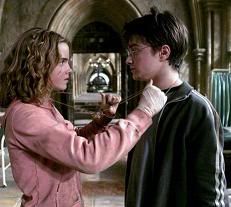Harry Potter and the Test of Time
By Ciel W.

Many times when we refer to

Harry Potter has been very popular among the readers of today. It has created a respect and love for books, and paved a new literature focused on the younger minds. However, I do not think it’s a literary masterpiece. J.K. Rowling isn’t leaving behind a literary legacy; Harry Potter’s strength lies on the memorable characters, fantastical settings, and magic. Rowling cannot be compared to the brilliant minds of C.S. Lewis and J.R.R. Tolkien solely because their mission for writing is completely different. Past generations of children’s book were simple (character-wise) and reinforced an idea, they were meant to educate and pass along the values of a culture (e.g. The Chronicles of Narnia). Today, however, intricate characters and themes are more essential.
My first paragraph clearly expresses a pattern for the readers of Harry Potter. It is a children’s book, therefore, it will be a family favorite for a long time. It wouldn’t surprise me if parents who read Harry Potter in their childhood passed on the book to their children and so on. I believe this is the only way it is going to survive the test of time, at least for a while. The books have become widely popular because of its characters and the “school setting”. Children can relate to the characters easily. There are good and bad teachers, best friends and enemies, relationships, defiance of authority, and an escape of this reality into a realm of magic. Rowling also made the books more complex during the last installments when she added politics, terrorism, and a darker tone to the series; thus increasing the complex depth and alluring more readers.
There is no immediate apparent intellectual quality of writing in the series. It is your everyday language with few long and difficult-to-pronounce words, extensive paragraphs, and infused with great deal of dialogue, hence why I believe the characters are the ones that will stand the test of time longer, and not the books themselves. There is some weaving of moral qualities and virtues in the book, but the idea behind those are usually stereotypical and repetitive.
Harry Potter might be a fantasy classic for this generation. It has opened the doors for so many authors and potential readers that, through the years to come, the [Harry Potter] books run the risk of being lost with the influx of new novels and series. For me, it seems like teenagers are straying away from Harry Potter and plunging themselves into dark, supernatural, young adult fiction (e.g. Cassandra Clare, Lauren Kate, L.J. Smith, Darren Shan, to name a few). The attention of writers has never been more focused on writing for children and teenagers in past time than it is now.
Moreover, Harry Potter is a book that belongs to this generation, beloved by the readers of today. Our world and societies inherently shifts as the years pass, and books will to. I think Harry Potter [books] is unique because it attracts a varied and broader audience (as opposed to the “Classics”, read by few people).
I believe it has created a different type of classic that not necessarily has to endure time. But if it does, it’s an added bonus.